各国经济权利和义务宪章
- 格式:doc
- 大小:44.00 KB
- 文档页数:8
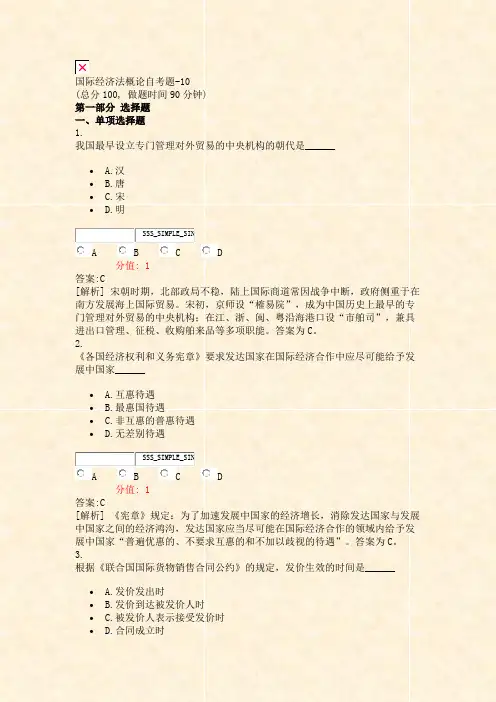
国际经济法概论自考题-10(总分100, 做题时间90分钟)第一部分选择题一、单项选择题1.我国最早设立专门管理对外贸易的中央机构的朝代是______• A.汉• B.唐• C.宋• D.明SSS_SIMPLE_SINA B C D分值: 1答案:C[解析] 宋朝时期,北部政局不稳,陆上国际商道常因战争中断,政府侧重于在南方发展海上国际贸易。
宋初,京师设“榷易院”,成为中国历史上最早的专门管理对外贸易的中央机构;在江、浙、闽、粤沿海港口设“市舶司”,兼具进出口管理、征税、收购舶来品等多项职能。
答案为C。
2.《各国经济权利和义务宪章》要求发达国家在国际经济合作中应尽可能给予发展中国家______• A.互惠待遇• B.最惠国待遇• C.非互惠的普惠待遇• D.无差别待遇SSS_SIMPLE_SINA B C D分值: 1答案:C[解析] 《宪章》规定:为了加速发展中国家的经济增长,消除发达国家与发展中国家之间的经济鸿沟,发达国家应当尽可能在国际经济合作的领域内给予发展中国家“普遍优惠的、不要求互惠的和不加以歧视的待遇”。
答案为C。
3.根据《联合国国际货物销售合同公约》的规定,发价生效的时间是______• A.发价发出时• B.发价到达被发价人时• C.被发价人表示接受发价时• D.合同成立时SSS_SIMPLE_SINA B C D分值: 1答案:B[解析] 发价于到达被发价人时生效。
就是说,发价人于发价送达被发价人时即受其发价的约束。
答案为B。
4.在国际货物买卖中,被发价人在接到发价人的发价内容后,就发价内容按自己的意思加以改动,送还发价人,这就是______• A.讨价• B.还价• C.喊价• D.谈判SSS_SIMPLE_SINA B C D分值: 1答案:B[解析] 本题是对“还价”概念的考查。
一项生效的发价,对被发价人来说,他可以接受,也可以不接受,还可就发价内容按自己的意思加以改动,送还发价人,这便是所谓的“还价”。
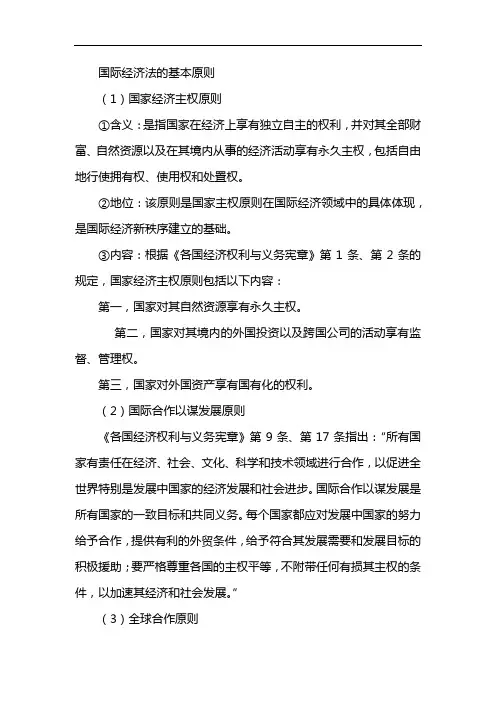
国际经济法的基本原则(1)国家经济主权原则①含义:是指国家在经济上享有独立自主的权利,并对其全部财富、自然资源以及在其境内从事的经济活动享有永久主权,包括自由地行使拥有权、使用权和处置权。
②地位:该原则是国家主权原则在国际经济领域中的具体体现,是国际经济新秩序建立的基础。
③内容:根据《各国经济权利与义务宪章》第1条、第2条的规定,国家经济主权原则包括以下内容:第一,国家对其自然资源享有永久主权。
第二,国家对其境内的外国投资以及跨国公司的活动享有监督、管理权。
第三,国家对外国资产享有国有化的权利。
(2)国际合作以谋发展原则《各国经济权利与义务宪章》第9条、第17条指出:“所有国家有责任在经济、社会、文化、科学和技术领域进行合作,以促进全世界特别是发展中国家的经济发展和社会进步。
国际合作以谋发展是所有国家的一致目标和共同义务。
每个国家都应对发展中国家的努力给予合作,提供有利的外贸条件,给予符合其发展需要和发展目标的积极援助;要严格尊重各国的主权平等,不附带任何有损其主权的条件,以加速其经济和社会发展。
”(3)全球合作原则①南北合作(中心环节)原因:A南北矛盾是当代国际经济关系中的主要矛盾。
B南北矛盾的根源在于世界财富的国际分配存在严重不公。
C南北矛盾的实质是发达国家凭借其历史上长期形成的、在国际经济体系中的垄断地位和绝对优势继续控制和盘剥发展中国家,力图维护国际经济旧秩序;而发展中国家不愿继续忍受发达国家的控制和剥削,为维护其民族经济利益和抗争,力图变革国际经济旧秩序和建立国际经济新秩序。
D南北具有明显的相互依存性。
实践:1975年2月,属于第三世界的非洲、加勒比和太平洋地区的46个发展中国家与欧洲共同体的9个国家在西非国家多哥的首都洛美签订了贸易和经济协定,简称《洛美协定》。
此后,陆续签定了三个《洛美协定》,最后一个洛美协定与2000年期满。
2000年6月,欧盟15个成员国与非家太地区77个国家在贝宁的科托努共同签署了新的《伙伴关系协定》,简《科托努协定》,取代了原先的《洛美协定》。
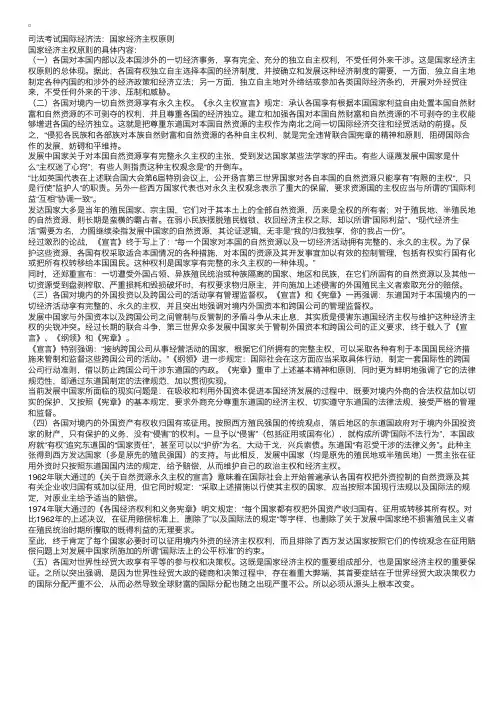
司法考试国际经济法:国家经济主权原则国家经济主权原则的具体内容:(⼀)各国对本国内部以及本国涉外的⼀切经济事务,享有完全、充分的独⽴⾃主权利,不受任何外来⼲涉。
这是国家经济主权原则的总体现。
据此,各国有权独⽴⾃主选择本国的经济制度,并按确⽴和发展这种经济制度的需要,⼀⽅⾯,独⽴⾃主地制定各种内国的和涉外的经济政策和经济⽴法;另⼀⽅⾯,独⽴⾃主地对外缔结或参加各类国际经济条约,开展对外经贸往来,不受任何外来的⼲涉、压制和威胁。
(⼆)各国对境内⼀切⾃然资源享有永久主权。
《永久主权宣⾔》规定:承认各国享有根据本国国家利益⾃由处置本国⾃然财富和⾃然资源的不可剥夺的权利,并且尊重各国的经济独⽴。
建⽴和加强各国对本国⾃然财富和⾃然资源的不可剥夺的主权能够增进各国的经济独⽴。
这就是把尊重东道国对本国⾃然资源的主权作为南北之间⼀切国际经济交往和经贸活动的前提。
反之,“侵犯各民族和各部族对本族⾃然财富和⾃然资源的各种⾃主权利,就是完全违背联合国宪章的精神和原则,阻碍国际合作的发展,妨碍和平维持。
发展中国家关于对本国⾃然资源享有完整永久主权的主张,受到发达国家某些法学家的抨击。
有些⼈诬蔑发展中国家是什么“主权迷了⼼窍”;有些⼈则指责这种主权观念是“的开倒车。
“⽐如英国代表在上述联合国⼤会第6届特别会议上,公开扬⾔第三世界国家对各⾃本国的⾃然资源只能享有”有限的主权“,只是⾏使”监护⼈“的职责。
另外⼀些西⽅国家代表也对永久主权观念表⽰了重⼤的保留,要求资源国的主权应当与所谓的”国际利益“互相”协调⼀致“。
发达国家⼤多是当年的殖民国家、宗主国,它们对于其本⼟上的全部⾃然资源,历来是全权的所有者;对于殖民地、半殖民地的⾃然资源,则长期是蛮横的霸占者。
在弱⼩民族摆脱殖民枷锁、收回经济主权之际,却以所谓“国际利益”、“现代经济⽣活”需要为名,⼒图继续染指发展中国家的⾃然资源,其论证逻辑,⽆⾮是“我的归我独享,你的我占⼀份”。
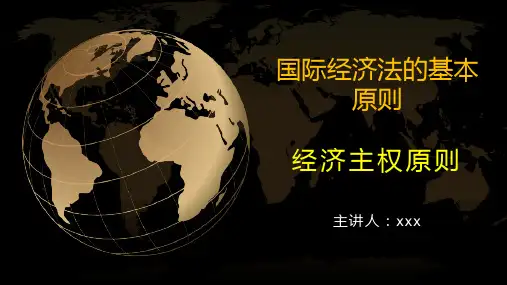
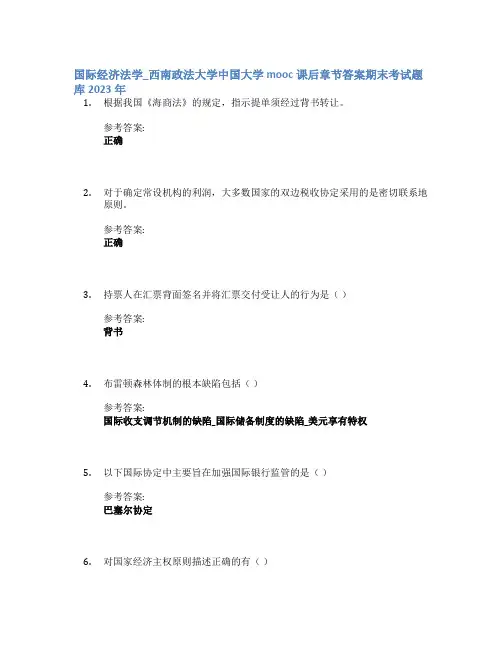
国际经济法学_西南政法大学中国大学mooc课后章节答案期末考试题库2023年1.根据我国《海商法》的规定,指示提单须经过背书转让。
参考答案:正确2.对于确定常设机构的利润,大多数国家的双边税收协定采用的是密切联系地原则。
参考答案:正确3.持票人在汇票背面签名并将汇票交付受让人的行为是()参考答案:背书4.布雷顿森林体制的根本缺陷包括()参考答案:国际收支调节机制的缺陷_国际储备制度的缺陷_美元享有特权5.以下国际协定中主要旨在加强国际银行监管的是()参考答案:巴塞尔协定6.对国家经济主权原则描述正确的有()国家对外享受开展经济活动享有最高权力_国家经济主权原则是国际经济法的首要原则_国家对自然资源享有永久主权7.国际经济组织是基于国家间的主权平等而设立的机构。
参考答案:错误8.《国际货币基金协定》不涉及对于成员国的汇率监管。
参考答案:错误9.FOB上海是指目的港位于上海。
参考答案:错误10.中国大通公司以CIF(incoterms2010)价向某国爱思公司出口一批服装,以信用证方式付款,有关运输合同明确约定适用1924年《海牙规则》。
大通公司在装船并取得提单后,办理了议付。
三天后,大通公司接爱思公司来电,称装船的海轮在海上因雷击失火,该批服装全部烧毁。
下列说法正确的有()参考答案:爱思公司应向保险公司提出索赔11.战后国际经济体制和秩序的三大支柱不包括()联合国12.国际保理业务集现代信息技术和同际金融业务于一身,已经发展成为国际贸易结算中一种有效的竞争手段。
其特点有()参考答案:转让应收账款使出口商获得资金融通_由保理公司负责进口商的资信调查_转让应收账款使出口商规避了坏账风险13.关于世界贸易组织争端解决机制的说法正确的有()参考答案:磋商是必经程序14.下列有关资本弱化避税的内容说法错误的是()参考答案:股份投资取得的股息通常属于可列支费用15.关于国际货物买卖合同的说法正确的有()参考答案:在确定国际货物贸易中买卖双方的权利义务时,一般应优先考虑买卖双方合同中的约定16.根据《国际货物销售合同公约》的规定,某商家在其订约建议中加有“仅供参考”字样,这一订约建议为()参考答案:要约邀请17.根据《国际货物销售合同公约》的规定,关于权利担保义务的说法错误的有()参考答案:只有当第三方对货物由所有权时,卖方才被视为没有尽到权利担保义务_若第三方对交易货物拥有知识产权,则卖方被视为没有尽到权利担保义务18.国际税收协定中对于“禁止对缔约国国民的税收歧视”规定,是最惠国待遇原则在税收领域的体现。
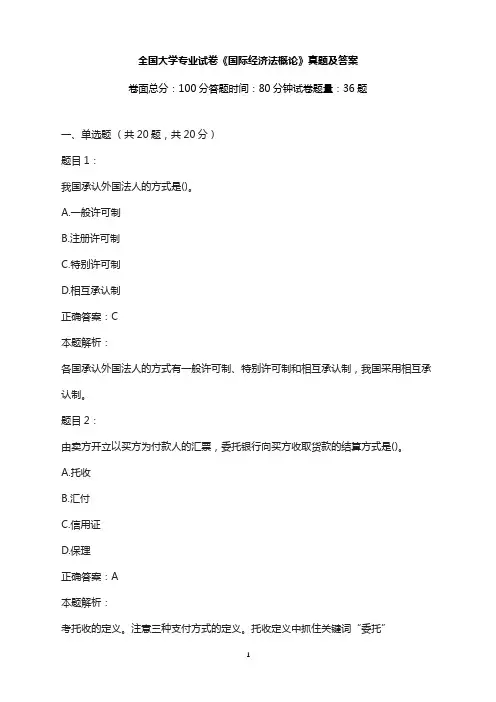
全国大学专业试卷《国际经济法概论》真题及答案卷面总分:100分答题时间:80分钟试卷题量:36题一、单选题(共20题,共20分)题目1:我国承认外国法人的方式是()。
A.一般许可制B.注册许可制C.特别许可制D.相互承认制正确答案:C本题解析:各国承认外国法人的方式有一般许可制、特别许可制和相互承认制,我国采用相互承认制。
题目2:由卖方开立以买方为付款人的汇票,委托银行向买方收取货款的结算方式是()。
A.托收B.汇付C.信用证D.保理正确答案:A本题解析:考托收的定义。
注意三种支付方式的定义。
托收定义中抓住关键词“委托”题目3:规定一家付款银行,该银行在受益人提交符合信用证规定的单据时并不付款,而是在信用证规定的到期日才予以付款,这样的信用证是()。
A.即期信用证B.议付信用证C.承兑信用证D.迟期信用证正确答案:D本题解析:考点是信用证的种类。
即期信用证是银行在受益人提交符合信用证要求的单据时即予以付款。
承兑信用证和迟期信用证有相似处,都是适用远期汇票,在信用证到期日付款,但是承兑信用证是承兑行在受益人交单后先承兑。
议付信用证是有一家议付行在开证行付款前提前买入汇票和单据,等于是提前付款给受益人,然后议付行再在信用证到期日将单据提交给开证行索偿。
题目4:采用FOB 贸易术语时,货物风险从卖方转移到买方是在()。
A.目的港船上B.目的港码头C.装运港码头D.装运港船上正确答案:D题目5:《汉堡规则》规定的赔偿限额是每件货物或每一货运单位不超过()。
A.100 英镑B.1000 欧元C.1000 金法郎D.835 特别提款权正确答案:D本题解析:注意识记《海牙规则》承运人的赔偿责任限额是每一计算单位100 英镑,《维斯比规则》是10000 金法郎,但是从《海牙-维斯比议定书》开始将金法郎兑换成特别提款权。
题目6:国际海上货物运输保险中属于基本险的是()。
A.拒收险B.平安险C.战争险D.罢工险正确答案:B本题解析:中国人民财产保险股份有限公司的海洋运输货物保险条款中规定的基本险是:平安险、水渍险和一切险。
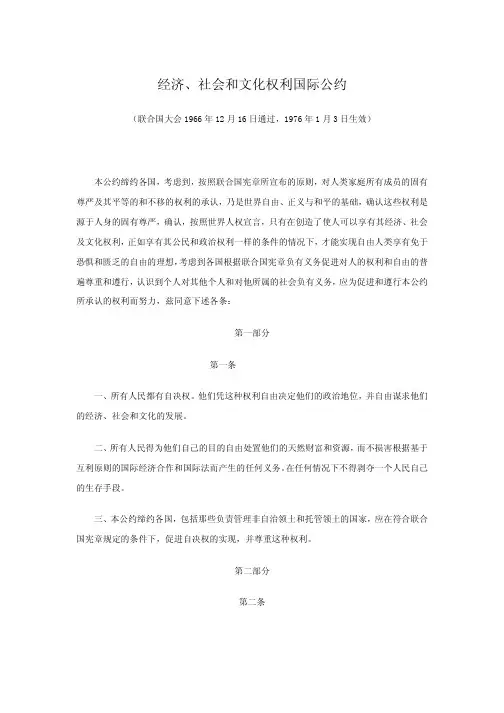
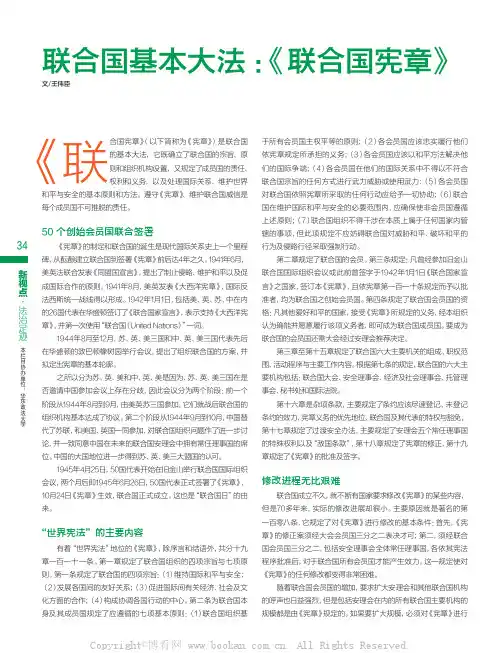
34新视点·法治足迹联合国基本大法:《联合国宪章》文/王伟臣《联合国宪章》(以下简称为《宪章》)是联合国的基本大法,它既确立了联合国的宗旨、原则和组织机构设置,又规定了成员国的责任、权利和义务,以及处理国际关系、维护世界和平与安全的基本原则和方法。
遵守《宪章》、维护联合国威信是每个成员国不可推脱的责任。
50个创始会员国联合签署《宪章》的制定和联合国的诞生是现代国际关系史上一个里程碑,从酝酿建立联合国到签署《宪章》前后达4年之久。
1941年6月,美英法联合发表《同盟国宣言》,提出了制止侵略、维护和平以及促成国际合作的原则。
1941年8月,美英发表《大西洋宪章》,国际反法西斯统一战线得以形成。
1942年1月1日,包括美、英、苏、中在内的26国代表在华盛顿签订了《联合国家宣言》,表示支持《大西洋宪章》,并第一次使用“联合国(United Nations)”一词。
1944年8月至12月,苏、英、美三国和中、英、美三国代表先后在华盛顿的敦巴顿橡树园举行会议,提出了组织联合国的方案,并拟定出宪章的基本轮廓。
之所以分为苏、英、美和中、英、美是因为,苏、英、美三国在是否邀请中国参加会议上存在分歧,因此会议分为两个阶段:前一个阶段从1944年8月到9月,由美英苏三国参加,它们就战后联合国的组织机构基本达成了协议。
第二个阶段从1944年9月到10月,中国替代了苏联,和美国、英国一同参加,对联合国组织问题作了进一步讨论,并一致同意中国在未来的联合国安理会中拥有常任理事国的席位。
中国的大国地位进一步得到苏、英、美三大盟国的认可。
1945年4月25日,50国代表开始在旧金山举行联合国国际组织会议,两个月后即1945年6月26日,50国代表正式签署了《宪章》,10月24日《宪章》生效,联合国正式成立。
这也是“联合国日”的由来。
“世界宪法”的主要内容有着“世界宪法”地位的《宪章》,除序言和结语外,共分十九章一百一十一条。
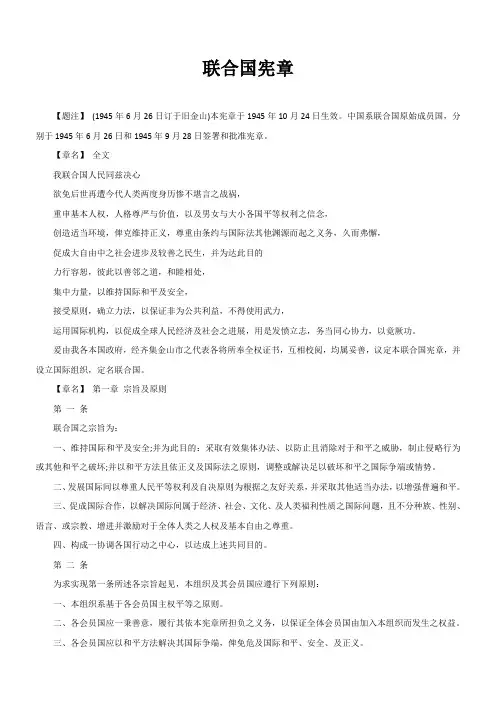
联合国宪章【题注】(1945年6月26日订于旧金山)本宪章于1945年10月24日生效。
中国系联合国原始成员国,分别于1945年6月26日和1945年9月28日签署和批准宪章。
【章名】全文我联合国人民同兹决心欲免后世再遭今代人类两度身历惨不堪言之战祸,重申基本人权,人格尊严与价值,以及男女与大小各国平等权利之信念,创造适当环境,俾克维持正义,尊重由条约与国际法其他渊源而起之义务,久而弗懈,促成大自由中之社会进步及较善之民生,并为达此目的力行容恕,彼此以善邻之道,和睦相处,集中力量,以维持国际和平及安全,接受原则,确立力法,以保证非为公共利益,不得使用武力,运用国际机构,以促成全球人民经济及社会之进展,用是发愤立志,务当同心协力,以竟厥功。
爰由我各本国政府,经齐集金山市之代表各将所奉全权证书,互相校阅,均属妥善,议定本联合国宪章,并设立国际组织,定名联合国。
【章名】第一章宗旨及原则第一条联合国之宗旨为:一、维持国际和平及安全;并为此目的:采取有效集体办法、以防止且消除对于和平之威胁,制止侵略行为或其他和平之破坏;并以和平方法且依正义及国际法之原则,调整或解决足以破坏和平之国际争端或情势。
二、发展国际间以尊重人民平等权利及自决原则为根据之友好关系,并采取其他适当办法,以增强普遍和平。
三、促成国际合作,以解决国际间属于经济、社会、文化、及人类福利性质之国际问题,且不分种族、性别、语言、或宗教、增进并激励对于全体人类之人权及基本自由之尊重。
四、构成一协调各国行动之中心,以达成上述共同目的。
第二条为求实现第一条所述各宗旨起见,本组织及其会员国应遵行下列原则:一、本组织系基于各会员国主权平等之原则。
二、各会员国应一秉善意,履行其依本宪章所担负之义务,以保证全体会员国由加入本组织而发生之权益。
三、各会员国应以和平方法解决其国际争端,俾免危及国际和平、安全、及正义。
四、各会员国在其国际关系上不得使用威胁或武力,或以与联合国宗旨不符之任何其他方法,侵害任何会员国或国家之领土完整或政治独立。
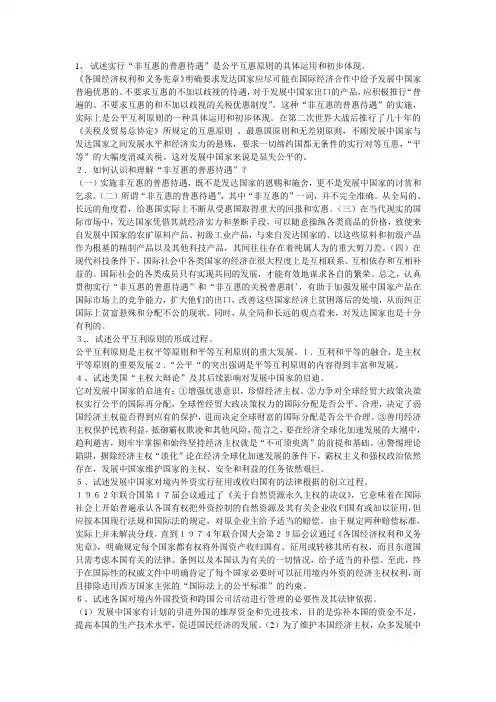
1、试述实行“非互惠的普惠待遇”是公平互惠原则的具体运用和初步体现。
《各国经济权利和义务宪章》明确要求发达国家应尽可能在国际经济合作中给予发展中国家普遍优惠的、不要求互惠的不加以歧视的待遇,对于发展中国家出口的产品,应积极推行“普遍的、不要求互惠的和不加以歧视的关税优惠制度”。
这种“非互惠的普惠待遇”的实施,实际上是公平互利原则的一种具体运用和初步体现。
在第二次世界大战后推行了几十年的《关税及贸易总协定》所规定的互惠原则、最惠国原则和无差别原则,不顾发展中国家与发达国家之间发展水平和经济实力的悬殊,要求一切缔约国都无条件的实行对等互惠,“平等”的大幅度消减关税。
这对发展中国家来说是显失公平的。
2.如何认识和理解“非互惠的普惠待遇”?(一)实施非互惠的普惠待遇,既不是发达国家的恩赐和施舍,更不是发展中国家的讨赏和乞求。
(二)所谓“非互惠的普惠待遇”,其中“非互惠的”一词,并不完全准确。
从全局的、长远的角度看,给惠国实际上不断从受惠国取得重大的回报和实惠。
(三)在当代现实的国际市场中,发达国家凭借其就经济实力和垄断手段,可以随意操纵各类商品的价格,致使来自发展中国家的农矿原料产品、初级工业产品,与来自发达国家的、以这些原料和初级产品作为根基的精制产品以及其他科技产品,其间往往存在着纯属人为的重大剪刀差。
(四)在现代科技条件下,国际社会中各类国家的经济在很大程度上是互相联系、互相依存和互相补益的。
国际社会的各类成员只有实现共同的发展,才能有效地谋求各自的繁荣。
总之,认真贯彻实行“非互惠的普惠待遇”和“非互惠的关税普惠制',有助于加强发展中国家产品在国际市场上的竞争能力,扩大他们的出口,改善这些国家经济上贫困落后的处境,从而纠正国际上贫富悬殊和分配不公的现状。
同时,从全局和长远的观点看来,对发达国家也是十分有利的。
3,.试述公平互利原则的形成过程。
公平互利原则是主权平等原则和平等互利原则的重大发展。
1.互利和平等的融合,是主权平等原则的重要发展2.“公平“的突出强调是平等互利原则的内容得到丰富和发展。
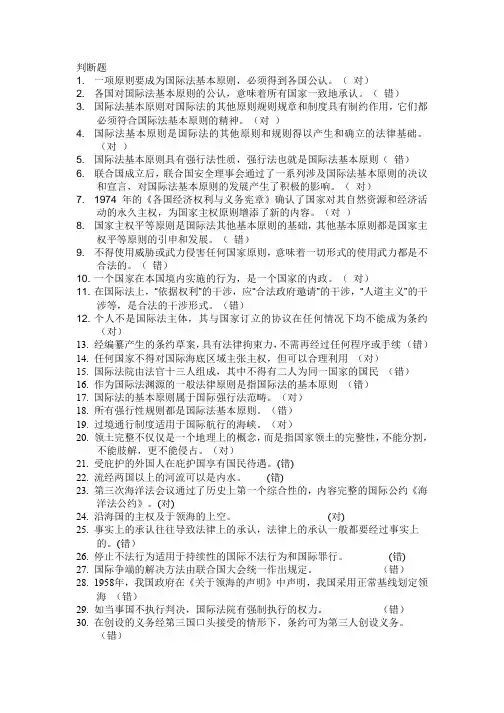
判断题1. 一项原则要成为国际法基本原则,必须得到各国公认。
(对)2. 各国对国际法基本原则的公认,意味着所有国家一致地承认。
(错)3. 国际法基本原则对国际法的其他原则规则规章和制度具有制约作用,它们都必须符合国际法基本原则的精神。
(对)4. 国际法基本原则是国际法的其他原则和规则得以产生和确立的法律基础。
(对)5. 国际法基本原则具有强行法性质,强行法也就是国际法基本原则(错)6. 联合国成立后,联合国安全理事会通过了一系列涉及国际法基本原则的决议和宣言,对国际法基本原则的发展产生了积极的影响。
(对)7. 1974年的《各国经济权利与义务宪章》确认了国家对其自然资源和经济活动的永久主权,为国家主权原则增添了新的内容。
(对)8. 国家主权平等原则是国际法其他基本原则的基础,其他基本原则都是国家主权平等原则的引申和发展。
(错)9. 不得使用威胁或武力侵害任何国家原则,意味着一切形式的使用武力都是不合法的。
(错)10. 一个国家在本国境内实施的行为,是一个国家的内政。
(对)11. 在国际法上,“依据权利”的干涉,应“合法政府邀请”的干涉,“人道主义”的干涉等,是合法的干涉形式。
(错)12. 个人不是国际法主体,其与国家订立的协议在任何情况下均不能成为条约(对)13.经编纂产生的条约草案,具有法律拘束力,不需再经过任何程序或手续(错)14.任何国家不得对国际海底区域主张主权,但可以合理利用(对)15.国际法院由法官十三人组成,其中不得有二人为同一国家的国民(错)16.作为国际法渊源的一般法律原则是指国际法的基本原则(错)17.国际法的基本原则属于国际强行法范畴。
(对)18.所有强行性规则都是国际法基本原则。
(错)19.过境通行制度适用于国际航行的海峡。
(对)20.领土完整不仅仅是一个地理上的概念,而是指国家领土的完整性,不能分割,不能肢解,更不能侵占。
(对)21.受庇护的外国人在庇护国享有国民待遇。
国际经济法错题整理8. 国际经济法中的首要基本规范是()A.经济主权原则B.公平互利原则C.全球合作原则D.有约必守原则答案:A。
经济主权原则是国际经济法的首要基本规范。
2. 下列哪些属于国际商业惯例的特点()A. 国际商业惯例是强制性的国际经济法律渊源B. 国际商业惯例是任意性规范,只有在当事人明确选择适用的情况下才对当事人具有约束力C. 当事人在选择适用商业惯例时,不得对该商业惯例的内容进行任何的修改D. 当事人在选择适用商业惯例时,可以对该商业惯例进行增、改、删答案:BD。
国际商事惯例、是长期的国际经济交往中经过反复使用而形成的不成文的规则。
国际商事惯例属于任意性的规范,而且当事人可以对该国际惯例的内容进行修改。
3. 下列哪些是广义的国际经济法所调整的关系()A.营业地位于甲国的达维公司与营业地位于中国的彩虹公司之间的贸易关系B.甲国籍人A与乙国籍人B之间的婚姻关系C.甲国家与乙国家间的双边投资保护协定D.中国甲公司与中国乙公司之间的采购合同关系答案:AC。
B项由国际法调整,D项则属于国内法调整范围4.下列关于国际经济法的各项陈述,哪些是正确的()A.国际商业惯例是在长期的国际经济交往中经过反复使用而形成的成为规则B.国际经济条约是国家及国际经济组织为确定其相互之间的权利义务所达成的书面协议C.国际经济法的基本原则是指被国际社会公认的,对国际经济法的各个领域都具有普遍指导意义的原则D.国际经济法主体是指在国际关系中能行驶权利和承担义务的法律人格者答案:BC。
国际商业惯例,是在长期的国际交往过程中形成的习惯性做法。
6.下列说法中正确的有()A.国际经济条约是国家及国际经济组织为确定其相互之间的权利义务而达成的书面协议B.国际经济法的基本原则是指国际社会公认的、对国际经济法的各个领域都具有普遍指导意义的原则C.国际商业惯例是在长期的国际经济交往中经过反复使用而形成的成文规则,不能随意修改D.国际经济法主体是指在国家经济关系中能行使权利的承担义务的法律人格者答案:C错误,国际商事惯例,是在长期的国际经济交往中经过反复使用而形成的不成文规则。
Charter of Economic Rights and Duties of StatesGA Res. 3281(xxix), UN GAOR, 29th Sess., Supp. No. 31 (1974) 50The General Assembly,Recalling that the United Nations Conference on Trade and Development, in its resolution 45 (III) of 18 May 1972, stressed the urgency to establish generally accepted norms to govern international economic relations systematically and recognized that it is not feasible to establish a just order and a stable world as long as a charger to protect t he rights of all countries, and in particular the developing States, is not formulated. Recalling further that in the same resolution it was decided to establish a Working Group of governmental representatives to draw up a draft Charter of Econom ic Rights and Duties of States, which the General Assembly, in its resoluti on 3037 (XXVII) of 19 December 1972, decided should be composed of forty Member States. Noting that, in its resolution 3082 (XXVIII) of 6 December 1973, it reaffi rmed its conviction of the urgent need to establish or improve norms of universal application for t he development of international economic relations on a just and equitable basis and urged the Working Group on the Charter of Economic Rights and Duties of States to complete, as the first step in the codification and development of the matter, the elaboration of a final draft Char ter of Economic Rights and Du ties of States, to be considered and approved by the General A ssembly at its twenty-ninthsession.Bearing in mind the spirit and terms of its resolutions 3201 (S-VI) and 3202 (S-VI) of 1 May 1974, containing, respectively, the Declaration and the Pr ogrammed of Action on the Establishment of a New International Economic Order, whic h underlined the vital importance of the Charter to be adopted by the General Assembly at its twenty-ninth session and stressed the fact that the Charter shall constitute an effective instrument towards the establishment of a new system of international economic relations based on equity, sovereign equality and interdependence of the interests of developed and developing countries. Having examined the report of the Worki ng Group on the Charter of Ec onomic Rights and Duties of States on its fourth session, transmitted to the Generally Assembly by the Trade and Development Board at its fourteenth session. Expressing its appreciation to the Working Group on the Charter of Economic Rights and Duties of States which, as a result of the task perform ed in its four sessions held between February 1973 and June 1974, assembled the element s required for the completion and adoption of the Charter of Economic Rights and Duties at the twenty-ninth se ssion of the General Assembly, as previously recommended. Adopts and solemnly proclaims the following Charter: Charter of economic rights and duties of statesPreambleThe General Assembly,Reaffirming the fundamental purposes of the United Nations, in pa rticular the maintenance of international peace and security, the development of friendly relations among nations and the achievement of international co- operation in solving international problems in the economic and social fields, Affirming the need for strengthening internati onal co-operation for development, Declaring that it is a fundamental purpos e of the present Charter to promote the establishment of the new international economic order, based on equalit y, sovereign equality, interdependence, common interest and co-operation among all States, irres pective of their economic and social systems, Desirous of contributing to the criterion of conditions for:(a) The attainment of wider prosperity among all countries and of higher standards of living for all peoples,(b) The promotion by the entire international community of t he economic and social progress of all countries, especially developing countries,(c) The encouragement of co-operation, on the basis of mutual advantage and equitable benefits for all peace-loving States which are willing to carry out the provisions of the present Charter, in the economic, trade, scientific and technical fields, regardless of political, economic or social systems, (d) The overcoming of main obstacles in theway of economic development of the developing countries,(e) The acceleration of the economic growth of developing countries with a view to bridging the economic gap between developing and developed countries,(f) The protection, preservation and enhancement of the environment, Mindful of the need to establish and maintain a just and equitable economic and social order through:(a) The achievement of more rational and equitable international economic relations and the encouragement of structural changes in the world economy,(b) The creation of conditions which permit the further expansion of trade and intensification of economic co-operation among all nations, (c) The strengthening of the economic independence of developing countries,(d) The establishment and promotion of international economic relations, taking into account the agreed differences in development of the developing countries and their specific needs, Determined to promote collective economic security for development, in particular of the developing countries, with strict respect for the sovereign equality of each State and through the co-operation of the entire international community, Considering that genuine co-operation among States, based on joint consideration of and concerted action regarding internationaleconomic problems, is essential for fulfilling the international community's common desire to achieve a just and rational development of all parts of the world. Stressing the importance of ensuring appropriate conditions for the conduct of normal economic relations among all States, irrespective of differences in social and economic systems, and for the full respect of the rights of all peoples, as well as strengthening instruments of international economic co-operation as a means for the consolidation of peace for the benefit of all. Convinced of the need to develop a system of international economic relations on the basis of sovereign equality, mutual and equitable benefit and the close interrelationship of the interests of all States, Reiterating that the responsibility for the development of every country rests primarily upon itself but that concomitant and effective international cooperation is an essential factor for the full achievement of its own development goals. Firmly convinced of the urgent need to evolve a substantially improved system of international economic relations, Solemnly adopts the present Charter of Economic Rights and Duties of States.Chapter 1Fundamentals of international economic relations Economic as well as political and other relations among States shall be governed, inter alia , by the following principles:(a) Sovereignty, territorial integrity and political independence of States;(b) Sovereign equality of all States;(c) Non-aggression;(d) Non-intervention;(e) Mutual and equitable benefit;(f) Peaceful coexistence;(g) Equal rights and self-determination of peoples;(h) Peaceful settlement of disputes;(i) Remedying of injustices which have been brought about by force and which deprive a nation of the natural means necessary for its normal development;(j) Fulfillment in good faith of international obligations;(k) Respect for human rights and international obligations;(l) No attempt to seek hegemony and spheres of influence;(m) Promotion of international social justice;(n) International co-operation for development;(o) Free access to and from the sea by land-locked countries within the framework of the above principles.Chapter IIEconomic rights and duties of statesArticle 1Every State has the sovereign and inalienable right to choose itseconomic system as well as it political, social and cultural systems in accordance with the will of its people, without outside interference, coercion or threat in any form whatsoever.Article 21. Every State has and shall freely exercise full permanent sovereignty, including possession, use and disposal, over all its wealth, natural resources and economic activities.2. Each State has the right:(a) To regulate and exercise authority over foreign investment within its national jurisdiction in accordance with its laws and regulations and in conformity with its national objectives and priorities. No State shall be compelled to grant preferential treatment to foreign investment;(b) To regulate and supervise the activities of transnational corporations within its national jurisdiction and take measures to ensure that such activities comply with its laws, rules and regulations and conform with its economic and social policies. Transnational corporations shall not intervene in the internal affairs of a host State. Every State should, with full regard for its sovereign rights, cooperate with other States in the exercise of the right set forth in this subparagraph;(c) To nationalize, expropriate or transfer ownership of foreign property, in which case appropriate compensation should be paid by the State adopting such measures, taking into account its relevant laws andregulations and all circumstances that the State considers pertinent. In any case where the question of compensation gives rise to a controversy, it shall be settled under the domestic law of the nationalizing State and by its tribunals, unless it is freely and mutually agreed by all States concerned that other peaceful means be sought on the basis of the sovereign equa lity of States and in accordance with the principle of free choice of means.Article 3In the exploitation of natural resources shared by two or more countries, each State must co-operate on the basis of a system of information and prior consultations in order to achieve optimum use of such resources without causing damage to the legitimate interest of others.Article 4Every State has the right to engage in international trade and other forms of economic co-operation irrespective of any differences in political, economic and social systems. No State shall be subjected to discrimination of any kind based solely on such differences. In the pursuit of international trade and other forms of economic co-operation, every State is free to choose the forms of organization of its foreign economic relations and to enter into bilateral and multilateral arrangements consistent with its international obligations and with the needs of international economic co-operation.Article 5All States have the right to associate in organizations of primary commodity producers in order to develop their national economies, to achieve stable financing for their development and, in pursuance of their aims, to assist in the promotion of sustained growth of the world economy. In particular accelerating the development of developing countries. Correspondingly, all States have the duty to respect that right by refraining from applying economic and political measures that would limit it.Article 6It is the duty of States to contribute to the development of international trade of goods, particularly by means of arrangements and by the conclusion of long-term multilateral commodity agreements, where appropriate, and taking into account the interest of producers and consumers. All States share the responsibility to promote the regular flow and access of all commercial goods traded at stable, remunerative and equitable prices, thus contributing to the equitable development of the world economy, taking into account, in particular, the interests of developing countries.Article 7Every State has the primary responsibility to promote the economic, so cial and cultural development of its people. To this end, each State hasthe right and the responsibility to choose its means and goals of development, fully to mobilize and use its resources, to implement progressive economic and social reforms and to ensure the full parti cipation of its people in the process and benefits of development. All States have the duty, individually and collectively, to co-operate in elim inating obstacles that hinder such mobilization and use.Article 8States should co-operate in facilitating more rational and equitable international economic relations and in encouraging structural changes in the context of a balanced world economy in harmony with the needs and interests of all countries, especially developing countries, and should take appropriate measures to this end.Article 9All States have the responsibility to co-operate in the economic, social, cultural, scientific and technological fields for the promotion of economic and social progress throughout the world, especially that of the developing countries.Article 10All States are juridically equal and, as equal members of the international community, have the right to participate fully and effectively in the international decision-making process in the solution of world economic, financial and monetary problems, inter alia , through theappropriate international organizations in accordance with their existing and evolving rules, and to share in the benefits resulting therefrom. Article 11All States should co-operate to strengthen and continuously improve t he efficiency of international organizations in implementing measures to stimulate the general economic progress of all countries, particularly of developing countries, and therefore should cooperat e to adapt them, when appropriate, to the changing needs of international economic co-operation.Article 121. States have the right, in agreement with the parties concerned, to participate in subregional, regional interregional co-operation in the pursuit of their economic and social development. All States engaged in such co-operation have the duty to ensure that the policies of those groupings to which they belong correspond to the provisions of t he present Charter and are outward-looking, consistent with their international obligations and with the needs of international economic co-operation, and have full regard for the legitimate interests of third countries, especially developing countries.2. In the case of groupings to which the States concerned have transferred or may transfer certain competences as regards matters that come within t he scope of the present Charter, its provisions shall alsoapply to those groupings in regard to such matte rs, consistent with the responsibilities of such States as members of such groupings. Those States shall co-operate in the observance by the groupings of the provisions of this Charter.Article 131. Every State has the right to benefit from the advances and development in science and technology for the acceleration of its economic and social development.2. All States should promote international scientific and technological co-operation and the transfer of technology, with proper regard for a legitimate interests including, inter alia , the rights and duties of holders, suppliers and recipients of technology. In particular, all States should facilitate the access of developing countries to the achievements of modern science and technology, the transfer of technology and the creation of indigenous technology for the benefit of the developing coun tries in forms and in accordance with procedures which are suited to their economies and their needs.3. Accordingly, developed countries should co-operate with the developing countries in the establishment, strengthening and devel opment of their scientific and technological infrastructures and their scientific research and technological activities so as to help to expand and transform the economies of developing countries.4. All Sates should co-operate in research with a view to evolving further internationally accepted guidelines or regulations for the transfer of tec hnology, taking fully into account the interest of developing countries. Article 14Every State has the duty to co-operate in promoting a steady and increasing expansion and liberalization of world trade and an improvement in the welfare and living standards of all peoples, in particular those of developing countries. Accordingly, all States should co-operate, inter alia , towards the progressive dismantling of obstacles to trade and t he improvement of the international framework for the conduct of world trade and, to these ends, co-ordinated efforts shall be made to solve in an equitable way the trade problems of all countries, taking into account the specific trade problems of the developing countries. In this connection, States shall take measures aimed at securing additional benefits for the international trade of developing countries so as to achieve a substantial increase in their foreign exchange earnings, the diversification of their exports, the acceleration of the rate of growth of their trade, taking into account their development needs, an improvement in the possibilities for these countries to participate in the expansion of world trade and a balance more favourable to developing countries in the sharing of the advantages resulting from this expansion, through, in the largest possible measure, a substantialimprovement in the conditions of access for the products of interest to the developing countries and, wherever appropriate, measures designed to attain stable, equitable and remunerative prices for primary products.Article 15All States have the duty to promote the achievement of general and complete disarmament under effective international control and to utilize the resources released by effective disarmament measures for the economic and social development of countries, allocating a substantial portion of such resources as additional means for the development needs of developing countries.Article 161. It is the right and duty of all States, individually and collectively, to eliminate colonialism, apartheid, racial discrimination, neo-colonialism and all form s of foreign aggression, occupation and domination,and the economic and social consequences thereof, as a prerequisite for development. States which practise such coercive policies are economically responsible to the countries, territories and peoples affected for the restitution and full compensation for the exploitation and depletion of, and damages to, the natural and all other resources of those countries, territories and peoples. It is the duty of all States to extend assistance to them.2. No State has the right to promote or encourage investments that may constitute an obstacle to the liberation of a territory occupied by force. Article 17International co-operation for dev elopment in the shared goal and co mmon duty of all States. Every State should co-operate with the efforts of developing countries to accelerate their economic and social development by providing favourable external conditions and by extending active assistance to them, consistent with their development needs and objectives, with strict respect for the sovereign equality of States and free of any conditions derogating from their sovereignty. Article 18Developed countries should extend, improve and enlarge the system of generalized non-reciprocal and non-discriminatory tariff preferences to the developing countries consistent with the relevant agreed conclusions and relevant decisions as adopted on this subject, in the framework of the competent international organizations. Developed countries should also give serious consideration to the adoption of other differential measures, in areas where this is feasible and appropriate and in ways which will provide special and more favourable treatment, in order to meet the trade and development needs of the developing countries. In the conduct of inter national economic relations the developed countries should endeavour to avoid measures having a negative effect on thedevelopment of the national economies of the developing countries, as promoted by generalized tariff preferences and other generally agreed differential measures in their favour.Article 19With a view to accelerating the economic growth of developing countries and bridging the economic gap between developed and developing countries, dev eloped countries should grant generalized preferential, non-reciprocal and non-discriminatory treatment to developing countries in those fields of international economic co-operat ion where it may be feasible.Article 20Developing countries should, in their efforts to increase their over-all trade, give due attention to the possibility of expanding their trade with socialist countries, by granting to these countries conditions for trade not inferior to those granted normally to the developed market economy countries.Article 21Developing countries should endeavour to promote the expansion of their mutual trade and to this end may, in accordance with the existing and evolving provisions and procedures of international agreements where applicable, grant trade preferences to other dev eloping countries without being obliged to extend such preferences to developedcountries, provided these arrangements do not constitute an impediment to general trade liberalization and expansion.Article 221. All States should respond to the generally recognized or mutually agreed development needs and objectives of developing countries by promoting increased net flows of real resources to the developing countries from all sources, taking into account any obligations and commitments undertaken by the States concerned, in order to reinforce the efforts of developing countries to accelerate their economic and social development.2. In this context, consistent with the aims and objectives mentioned above and taking into account any obligations and commitments undertaken in this regard, it should be their endeavour to increase the net amount of financial flows from official sources to developing countries and to improve the terms and conditions thereof.3. The flow of development assistance resources should include economic and technical assistance.Article 23To enhance the effective mobilization of their own resources, the developing countries should strengthen their economic co-operation and expand their mutual trade so as to accelerate their economic and social development. All countries, especially developed countries, individuallyas well as through the competent international organizations of which they are members, should provide appropriate and effective support and co-operation.Article 24All States have the duty to conduct their mutual economic relations in a manner which takes into account the interest of other countries. In particular, all States should avoid prejudicing the interests of developing countries.Article 25In furtherance of world economic development, the international community, especially its developed members, shall pay special attention to the particular needs and problems of the least developed among the developing countries, of land-locked developing countries and also island developing countries, with a view to helping them to overcome their particular difficulties and thus contribute to their economic and social development.Article 26All States have the duty to coexist in tolerance and live together in peace, irrespective of differences in political, economic, social and cultural systems, and to facilitate trade between States having different economic and social systems. International trade should be conducted without prejudice to generalized non-discriminatory and non-reciprocalpreferences in favour of developing countries, on the basis of mutual advantage, equitable benefits and the exchange of most-favoured-nation treatment.Article 271. Every State has the right to enjoy fully the benefits of world invisible trade and to engage in the expansion of such trade.2. World invisible trade, based on efficiency and mutual and equitable benefit, furthering the expansionof the world economy, is the comm on goal of all States. The role of developing countries in worldinvisible trade should be enhanced and strengthened consis tent with the above objectives, particularattention being paid to the special needs of developing countries.3. All States should co- operate with developing countries in t heir endeavours to increase their capacityto earn foreign exchange from invisible transactions, in accordance with the potential and needs of eachdeveloping country and consistent with the objectives mentioned above. Article 28All States have the duty to co-operate in achieving adjustments in the prices of exports of developingcountries in relation to prices of their imports so as to promote just andequitable terms of trade for them, in a manner which is remunerative for producers and equitable for producers and consumers.Chapter IIICommon responsibilities towards the international communityArticle 29The sea-bed and ocean floor and the subsoil thereof, beyond the limits of national jurisdiction, as well as the resources of the area, are t he common heritage of mankind. On t he basis of the principles adopted by the General Assembly in resolution 2749 (XXV) of 17 December 1970, all States shall ensure that the exploration of the are and exploitation of its resources are carried out exclusively for peaceful purposes and that the benefits derived therefore are shared equitably by all States, taking into account the particular interest and needs of developing countries; an international regime applying to the area and its resources and including appropriate international machinery to give effect to its provisions shall be established by an international treaty of a universal character, generally agreed upon.Article 30The protection, preservation and enhancement of the environment for the present and future generations is the responsibility of all States. All States shall endeavour to establish their own environment and development policies in conformity with such responsibility. Theenviornmental policies of all States should enhance and not adversely affect the present and future development potential of developing countries. All States have t he responsibility to ensure that activities within their jurisdiction or control do not cause damage to the environment of other States or of areas beyond the limits of national jurisdiction. All States should co-operate in evolving international norms and regulations in the field of the environment.Chapter IVFinal provisionsArticle 31All States have the duty to contribute to the balanced expansion of the world economy, taking duly into account the close interrelationship between the we ll-being of the developed countries and the growth and development of the developing countries, and the fact that the prosperity of the international community as a whole depends upon the prosperity of its constituent parts.Article 32No State may use or encourage the use of economic, political or any ot her type of measures to coerce another State in order to obtain from it the subordination of the exercise of its sovereign rights.Article 331. Nothing in the present Charter shall be construed as impairing orderogating from the provisions of the Charter of the United Nations or actions taken into pursuance thereof.2. IN their interpretation and application, the provisions of the present Charter are interrelated and each provision should be construed in the context of the other provisions.Article 34An item on the Charter of Economic Rights and Duties of Sates shall be included in the agenda of the General Assembly at its thirtieth session, and thereafter on the agenda of every fifth session, In this way a systematic and comprehensive consideration of the implementation of the Charter, covering both progress achieved and any improvement and additions which might become necessary, would be carried out and appropriate measures recommended. Such consideration should take into account the evolution of all the economic, social, legal and other factors related to the principles upon which the present Charter is based and on its purpose.。
浅析国际经济法中的经济主权原则及其时代局限性摘要经济主权是每个独立自主的国家都享有的一项基本且重要的主权,它意味着国家有权在经济上独立、在国际经济局势上享有平等地位。
国际经济法将经济主权原则作为其中一个重要的基本原则,既是对各个国家主权的保护,也是对各国在公平参与国际经济事务提供保障。
然而,因为经济全球化的影响,许多国家都在不同程度上牺牲本国家的一定的经济主权,来谋求更多的发展机遇,这种现象在发展中国家尤为显著。
究竟应当如何在经济全球化的浪潮中既充分维护本国家的经济主权,又抓住机会大力发展经济成为了世界各国都必须考虑和面对的问题。
关键词:经济主权原则、经济主权一、经济主权原则概述(一)经济主权原则的提出第二次世界大战后,许多殖民地、半殖民地国家相继摆脱了殖民统治,成为了独立自主的主权国家。
但随后这些国家发现,这种形式上的独立并不能带给他们充分的发展空间。
长时间的殖民统治,导致了这些国家在经济上远落后于发达国家,所以它们不得不与原殖民国家签订不平等的协议与条约,出让本国的自然资源主权或是仍同意原殖民国家在本国取得特惠待遇,以谋求国家艰难的发展和庇护。
在这种情况下,提出主权原则的呼声在国际上越来越响亮。
在国家之内,国家主权之上不存在更高的权威,在国家之外,主权国家在国际经济竞争中享有平等地位,即“对内最高,对外独立”。
但是这些本该享有主权的国家仍处于列强的间接统治中,国内的自然资源以及重要的经济发展渠道都被外商和外国公司控制,仅仅享有极其残缺的政治主权。
摆脱列强的控制、维护国家的政治、经济主权的呼声也逐渐在国际社会显露。
在这种呼声下,经济主权原则被提出了。
(二)经济主权原则的形成过程1974年联合国大会第29届会议上通过的《各国经济权利和义务宪章》,明确的承认、提出并确定了每个独立自主的国家都应平等的享有经济主权。
《各国经济权利和义务宪章》规定:“每一个国家都有权确定本国的经济制度,任何国家、组织不得对此作出干涉。
2021年自学考试《国际经济法概论》复习笔记(二) 第二章国际经济法的基本原则国际经济法的基本原则,指的是贯串于调整国际经济关系的各类法律规范之中的主要精神和指导思想,是这些法律规范的基础和核心。
经济主权原则的基本内容及其形成过程经济主权原则是国际经济法中的首要基本规范。
1974年12月12日,联合国大会第29届会议通过了《各国经济权利和义务宪章》。
经济主权原则的主要内容表现在《宪章》第2条:“每个国家对本国的财富、自然资源以及全部经济活动,都享有并且可以自由行使完整的、永久的主权,其中包罗占有、使用和处置的权利。
”国家经济主权原则的具体内容大体上可分为以下三个方面:(一)各国对境内的一切自然资源享有永久主权(二)各国对境内的外国投资以及跨国公司的活动享有办理监督权(三)各国对境内的外国资产有权收归国有或征用第三节公平互利原则二、公平互利原则的初步实践一例:非互惠的遍及优惠待遇为了加速发展中国家的经济增长,消除发达国家与发展中国家之间的经济鸿沟,发达国家应当尽可能在国际经济合作的领域内给予发展中国家遍及优惠的、不要求互惠的和不加以歧视的待遇。
发达国家对发展中国家实行“非互惠的普惠待遇”,是公平互利原则的一种具体运用和初步表现。
第四节全球合作原则全球合作的基本目标:实行世界经济结构改革,建立公平合理的国际经济关系和国际经济新秩序,使全球所有国家都实现更遍及的繁荣,所有民族都达到更高的生活水平。
全球合作的基本范围:合作是多领域、多层次和全方位的。
全球合作的首要途径:所有国家在法律上一律平等,并且作为国际社会的平等成员,有权充分地和切实有效地参加解决世界性经济、财政、货币问题的国际决策,从而公平地分享由此而来的各种利益。
全球合作的中心环节:在于开展南北合作。
一、全球合作原则的中心环节:南北合作当代国际社会各类成员之间,存在着许多对矛盾与合作的关系。
其中比力重要的有:“东西关系”,通常指社会主义国家与本钱主义发达国家之间的关系:“南北关系”,通常是指发展中国家与发达国家之间的关系:“南南关系”,通常指发展中国家彼此之间的关系:“北北关系”,通常指发达国家之间的关系。
各国经济权利和义务宪章中的原则作为联合国的一个重要文件,《各国经济权利和义务宪章》于1948年正式通过。
这份宪章规定了全球范围内国家在经济领域的权利和义务,旨在促进各国发展和经济合作,实现共同繁荣。
下面将围绕这个宪章中的原则进行探讨。
第一步:权利原则在各国经济权利和义务宪章中,权利原则占有重要地位。
这个原则的核心是承认每个国家享有独立和自主的决策权,以及参与国际经济交流和贸易的自由。
这包括在其领土内自由使用资源和制定经济政策的权利。
在全球化的今天,更加重视国家间平等和相互尊重。
尊重其他国家的自主权,不干涉其他国家的内政。
在全球经济趋势的影响下,互联网、信息通讯技术等的普及,大大拓展了全球经济交往、科技创新和文化交流的空间。
人们追求互惠互利、合作共赢的思想也得到了更广泛的认同。
第二步:义务原则各国经济权利和义务宪章中的义务原则是指国家应当以各自的能力实现经济和社会发展,同时为全球经济稳定和繁荣做出贡献。
这包括支持各国间的经济合作、促进技术和资源的交流以及遵守国际贸易规则。
随着全球化的深入发展,人们对于国家之间互相依存、交流合作的要求也越来越高。
各国都应当承担起推进经济全球化和贸易自由化的责任。
同时,为实现经济发展,国家还应当在教育、卫生、环境保护等方面采取措施,努力缩小贫富差距,实现各项指标的可持续发展。
第三步:联合国组织的作用各国经济权利和义务宪章是联合国的一份非常重要的文件,是为实现联合国宪章目标而制定的。
在推动全球经济发展方面,联合国的作用是不可替代的。
联合国各机构都在为加强各国之间的合作、促进经济发展不断努力。
例如,联合国贸易和发展会议的任务就是促进发展中国家的经济发展,推动全球化进程中的平等和公正。
总的来说,各国经济权利和义务宪章的原则鼓励各国间相互协作,实现经济发展和全球经济繁荣。
各国应当共同努力,遵守国际法律,提高国际道德标准,推进经济全球化,促进经济稳定和可持续发展,使之成为一个更加公正、和谐、繁荣的世界。
各国经济权利和义务宪章经济发展是一个国家繁荣稳定的基石,也是国际社会共同发展的目标。
为了保障各国在经济领域的权利和履行相应的义务,联合国于1966年通过了《各国经济权利和义务宪章》。
该宪章旨在确保各国在经济发展中享有权利,并规定了各国在经济方面应履行的义务。
本文将介绍这一宪章的主要内容和对各国经济发展的影响。
一、宪章内容概述《各国经济权利和义务宪章》涵盖了一系列经济权利和义务,以确保各国在经济发展中得到平等对待和保护。
宪章共分为七个章节,包括《目标和原则》、《各国经济权利》、《各国发展政策》、《国际合作》、《技术援助》、《实施》和《争议解决》。
这些章节共同构成了一个综合性的框架,旨在促进全球经济合作和发展。
二、各国经济权利《各国经济权利和义务宪章》中明确规定了各国享有的经济权利。
这些权利包括:平等的贸易和经济机会、公平的竞争环境、自由选择经济体系、享有自主权利、国家资源的合理利用、自主制定经济政策等。
这些权利保证了各国在经济领域中的自主权和平等地位,为各国的经济发展提供了保障。
三、各国经济义务除了经济权利,各国也有一定的经济义务需要履行。
《各国经济权利和义务宪章》指出,各国有责任制定和执行适当的经济政策,以促进国内的发展和增加人民的福祉。
此外,各国还应加强国际合作,促进经济技术援助,尤其是向发展中国家提供帮助。
这些义务的履行将有助于实现全球经济的可持续发展和减少发展之间的差距。
四、对各国经济发展的影响各国经济权利和义务宪章的实施对于促进经济发展有着积极的影响。
首先,宪章确保了各国在经济合作中拥有平等对待的权利。
这将为各国提供更大的发展空间和机会,促进经济增长和繁荣。
其次,宪章明确了各国有责任制定合适的经济政策,这将有助于促进经济结构调整、提高生产力和实现可持续发展。
最后,宪章倡导国际合作和经济技术援助,这将有助于加强国际交流与合作,提高各国的经济水平和竞争力。
总结:《各国经济权利和义务宪章》是联合国为保障各国在经济领域的权利和履行义务而制定的一项重要文件。
各国经济权利和义务宪章联合国大会第3281(XXIX)号决议,由联合国大会第二委员会提出,编目:A/9946,1974年12月12日联合国大会第2315次会议以唱名表决方式通过,120票赞成,6票反对,10票弃权。
情况如下:赞成票:阿富汗、阿尔巴尼亚、阿尔及利亚、阿根廷、澳大利亚、巴哈马、巴林、孟加拉国、巴巴多斯、不丹、玻利维亚、博茨瓦纳、巴西、保加利亚、缅甸、布隆迪、白俄罗斯、中非共和国、乍得、智利、中国、哥伦比亚、刚果、哥斯达黎加、古巴、塞浦路斯、捷克斯洛伐克、达荷美、民主也门、多米尼加共和国、厄瓜多尔、埃及、萨尔瓦多、赤道几内亚、埃塞俄比亚、斐济、芬兰、加蓬、冈比亚、德意志民主共和国、加纳、希腊、格林纳达、危地马位、几内亚、几内亚比绍、圭亚那、海地、洪都拉斯、匈牙利、冰岛、印度、印度尼西亚、伊朗、伊拉克、象牙海岸、牙买加、约旦、肯尼亚、柬埔寨、科威特、老挝、黎巴嫩、莱索托、利比里亚、利比亚、马达加斯加、马拉维、马来西亚、马里、马耳他、毛里塔尼亚、毛里求斯、墨西哥、蒙古、摩洛哥、尼泊尔、新西兰、尼加拉瓜、尼日尔、尼日利亚、阿曼、巴基斯坦、巴拿马、巴拉圭、秘鲁、菲律宾、波兰、葡萄牙、卡塔尔、罗马尼亚、卢旺达、沙特阿拉伯、塞内加尔、塞拉利昂、新加坡、索马里、斯里兰卡、苏丹、斯威士兰、瑞典、叙利亚、泰国、多哥、特立尼达和多巴哥、突尼斯、土耳其、乌干达、乌克兰、苏联、阿拉伯联合酋长国、喀麦隆、坦桑尼亚、上沃尔特、乌拉圭、委内瑞拉、也门、南斯拉夫、扎伊尔、赞比亚。
反对票:比利时、丹麦、德意志联邦共和国、卢森堡、英国、美国。
弃权:奥地利、加拿大、法国、爱尔兰、以色列、意大利、日本、荷兰、挪威、西班牙。
联合国全体大会回忆起:联合国贸易和发展会议在其1972年5月18日的第45(Ⅲ)号决议中,曾经强调迫切需要建立一种大家都能接受的标准规范来系统地调整国际经济关系,并且认识到只要还没有制定出一部宪章来保障一切国家的权利,特别是保障发展中国家的权利,就不可能建立起公正的秩序和稳定的世界;进一步回忆起:在同一决议中,曾经决定设立一个由各国政府代表组成的工作小组,以便拟出一份《各国经济权利和义务宪章》的草案,而联合国全体大会则在1972年12月19日的第3037(XXⅦ)号决议中决定该工作小组应由40个联合国会员国组成;注意到:联合国全体大会在其1973年12月6日的第3082(XXⅧ)号决议中,重申确信迫切需要在公正和公平合理的基础上,为国际经济关系的发展制订或修订全世界普遍适用的标准规范,并且敦促《各国经济权利和义务宪章》起草工作小组,作为制订和发展标准规范的第一步,务必经过精心推敲,拟定《各国经济权利和义务宪章》的最后草案,以便提交联合国第29届全体大会审议、通过;念念不忘:联合国全体大会1974年5月1日的第3201(S-Ⅵ)号以及第3202(S-Ⅵ)号决议的精神和各项条款,这两项决议分别包含《建立新的国际经济秩序宣言》和《建立新的国际经济秩序行动纲领》,强调这部宪章将由联合国第29届全体大会加以通过的极大重要性,同时强调这部宪章必将成为一种得力的工具,大有助于在发达国家与发展中国家彼此待遇公平、主权平等以及利益相互依存的基础上,建立起国际经济关系的新体制;审议了《各国经济权利和义务宪章》起草工作小组第4次会议所拟定、并由贸易和发展理事会第14次会议转呈给联合国全体大会的报告书;表示感谢《各国经济权利和义务宪章》起草工作小组:作为工作小组在1973年2月至1974年6月期间举行四次会议执行任务的一大成果,它汇集了各种必要的因素,以便按照以前的建议,在联合国第29届全体大会上完成和通过《各国经济权利和义务宪章》;兹特通过并郑重公布下述《宪章》:各国经济权利和义务宪章序言联合国全体大会:重申联合国的基本宗旨,特别是重申要维持国际和平与安全,发展各国之间的友好关系,实现国际合作,以解决经济领域和社会领域中的国际问题;确认在上述这些领域中加强国际合作的必要;进一步重申为了发展而加强国际合作的必要;声明本宪章的基本宗旨,在于促进建立以一切国家待遇公平、主权平等、互相依存、共同受益及协力合作为基础的、新的国际经济秩序,而不问这些国家的经济和社会制订如何;迫切希望作出贡献,以便为以下各点创造条件:(1)一切国家都能实现更普遍的繁荣昌盛,一切民族都能达到更高的生活水平;(2)整个国际社会努力促进所有国家特别是发展中国家的经济进展和社会进步;(3)鼓励一切愿意贯彻执行本宪章各项规定的爱好和平的国家,在平等互利的基础上,在经济、贸易、科学和技术等领域中开展合作,而不问这些国家的政治、经济或社会制度如何;(4)克服发展中国家在经济发展路途中的各种主要障碍;(5)加速发展中国家的经济增长,以缩小发展中国家和发达国家之间的经济差距;(6)维护、保和改善环境。
注意到必须通过下列措施,建立和维持公正和公平合理的经济秩序及社会秩序:(1)实现更合理和更公平的国际经济关系,鼓励世界经济的结构改革。
(2)为在一切国家之间进一步扩大贸易、进一步加强经济合作创造条件。
(3)加强发展中国家的经济独立性。
(4)结合考虑各发展中国家在开发事业中大家公认的各种差别以及这些国家的各种特殊需要,建立并促进国际经济关系。
决心在严格尊重各国主权平等的条件下,通过整个国际社会的合作,增强集体的经济安全,以促进发展,特别是增进发展中国家的发展;考虑到:在各项国际经济问题上,以联合审议和一致行动作为基础,开展各国之间的真诚使用,这对于满足国际社会的共同愿望、实现全世界一切地区的公平合理发展说来,是必不可少的;强调:必须切实保证适当的条件,借以建立一切国家之间正常的经济关系,而不问各国社会制度和经济制度上的差别;并借以充分尊重世界一切民族的权利;同时,必须加强国际经济合作的各种手段,借以巩固和平,维护整体利益;确信必须在一切国家主权平等、公平互利以及彼此利益息息相关的基础上,进一步发展国际经济关系的体制;重申:每个国家的发展主要是依靠它本身的努力,但是,相应的和切实有效的国际合作对于彻底实现这些国家的发展目标说来,也是一项必不可少的因素;坚信:逐步建立一种从本质上加以改进的国际经济关系体制,乃是一项当务之急;因此,庄严地通过这一部《各国经济权利和义务宪章》。
第一章国际经济关系的基本准则各国之间的经济关系,同各国间的政治关系以及其他关系一样,应当特别受下列各项原则的制约:(1)各国主权、领土完整,各国政治独立;(2)一切国家主权平等;(3)互不侵犯;(4)互不干涉内政;(5)公平互利;(6)和平共处;(7)各民族权利平等,实行民族自决;(8)以和平手段解决各种争端;(9)纠正使用强迫手段侵夺别国正常发展所需要的自然资源的各种非正义行为;(10)真诚地履行各种国际义务;(11)尊重人权以及各种基本自由;(12)不谋求霸权以及各种势力范围;(13)增进国际社会正义;(14)开展国际合作以促进发展;(15)在上述各项原则的范围以内,局处内陆的国家享有进出海口的自由通道。
第二章各国的经济权利和经济义务第一条每个国家都享有独立自主的和不容剥夺的权利,可以根据本国人民的意愿,不仅选择本国的政治、社会和文化制度,而且选择本国的经济制度,不受任何形式的外来干涉、压制和威胁。
第二条一、每个国家对本国的全部财富、自然资源以及全部经济活动,都享有并且可以自由行使完整的、永久的主权,其中包括占有、使用及处置的权利。
二、每个国家都享有以下权利:(1)根据本国的法律和条例,按照本国的国家目标以及本国优先权的原则,在本国的管辖权范围以内,对外国投资加以管理并行使权力。
不得强迫任何国家给予外国投资特惠待遇;(2)在本国的管辖权范围以内,对跨国公司的经营活动加以管理和监督;采取各种措施,以保证上项活动遵守本国的法律、规章及条例,并符合于本国的经济政策和社会政策。
跨国公司不得干涉东道国的内政。
各国在行使本款规定权利的过程中,在充分重视本国主权权利的同时,应当同其他国家进行合作;(3)把外国资产收归国有、征用或转移其所有权。
在这种场合,采取上述措施的国家,应当考虑本国的有关法律、条例以及本国认为有关的一切情况,给予适当的赔偿。
赔偿问题引起争执时,应当根据采取国有化措施国家的国内法,由该国法院进行审理。
但各有关国家经过自由协商,一致同意在各国主权平等的基础上,按照自由选择解决途径的原则,采用其他和平解决办法的,不在此限。
第三条在开发属于两个或两个以上国家共有的自然资源时,各国必须在互通声气和事前协商的基础上通力合作,以便在不致损害其他国家合法权益的前提下,最适当地利用这些资源。
第四条每个国家都有权参加国际贸易以及其他各种形式的经济合作,而不问这些国家在政治、经济和社会制度上的任何差异。
不得仅仅根据上述这些差异而对任何国家加以任何形式的歧视。
在进行国际贸易以及其他各种形式的经济合作时,各国都可以自由选择本国对外经济关系的组织形式,自由参加各种双边和多边的安排。
这些安排应当符合于它们应尽的国际责任,符合国际经济合作的需要。
第五条一切国家都有权参加各种初级商品生产国的组织,以便发展本国的国民经济,实现财政稳定,促进本国的发展,并在实现本国目标的过程中,有助于促进世界经济的持续增长,特别是促进发展中国家的开发。
相应地,一切国家都有义务尊重上述权利,克制自己,不采取经济措施和政治措施,以限制这种权利。
第六条各国都有义务为发展国际商品贸易作出贡献,特别是通过各种安排以及在适当场合缔结长期多边商品协定来作出贡献;还应当兼顾生产国和消费国的利益。
一切国家都负有责任,促使在稳定的、有利可图的以及公平合理的价格下进行交易的一切商品,都能正常流通,从而有助于世界经济的公平发展,并且特别照顾到发展中国家的利益。
第七条各国首屈一指的责任是促进本国人民在经济、社会以及文化方面的发展。
为了实现这一宗旨,每个国家都有权利和责任选择本国发展的道路和目标,充分动员和利用本国的资源,实行进步的经济改革和社会改革,并且切实保证本国人民能够充分参加发展的过程,充分分享发展的利益。
一切国家都有义务进行个别的或集体的合作,以消除阻挡各国动员和利用本国资源的各种障碍。
第八条各国应当加强合作,促进建立更加公平合理的国际经济关系,并且鼓励实行结构改革,争取实现同一切国家、特别是同发展中国家的需要与利益相协调的平衡稳定的世界经济;为此目的,应当采取相应的措施。
第九条一切国家都有责任在经济、社会、文化、科学和技术等领域中协力合作,以促进整个世界特别是促进发展中国家的经济进展和社会进步。
第十条所有国家在法律上一律平等;并且作为国际社会的平等成员,有权充分地和切实有效地参加解决世界性的经济、财政金融以及货币等重要问题的国际决策过程;特别是有权通过相应的国际组织,并遵循这些组织的现行规章或逐步改善中的规章,参加这种国际决策过程,并且公平地分享由此而来的各种效益。